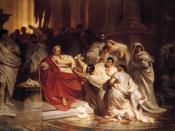For a story to be a tragedy it has to follow the principles set
by Aristotle, a Greek philosopher, or those of Arthur Miller
who is a twentieth century playwright. A tragedy, in Aristotle's
view, usually concerns the fall of an individual whose character is
good but not perfect and his misfortunes are brought about by the
tragic flaw. This flaw is the part of the character that personifies
him as being tragic. Miller uses this definition of a tragedy but
also broadens it including the common man. All of these
characteristics are seen in the plays Julius Caesar, Death of a
Salesman, and Oedipus Rex.
Although the title of the play Julius Caesar focuses on
Caesar, the play itself is really based on Brutus. 'Brutus had
rather be a villager than to repute himself a son of Rome.'(Act I,
scene II, line 172). This was said by Brutus after Cassius told him
how Caesar had become a towering figure over Rome and how
Caesar controls Rome.
Notice the good in Brutus, and the
extremes he will go to in order to protect democracy in Rome
even if it means killing the one he loves, Caesar. Brutus possesses
one of the most tragic flaws. He is too nice of a person and
therefore he gets taken advantage of. He lets Cassius persuade
him into killing Caesar for the good of Rome. Because he does
for others more than himself he makes a fatal mistake, he lets
Antony live. Brutus says to the conspirators, 'For Antony is but a
limb of Caesar'(Act II scene I line 165) meaning that if Caesar is
killed Antony will die off too. Brutus clearly does not regard
Antony as being a threat, but little does Brutus know that
Antony will stir up the town to...


